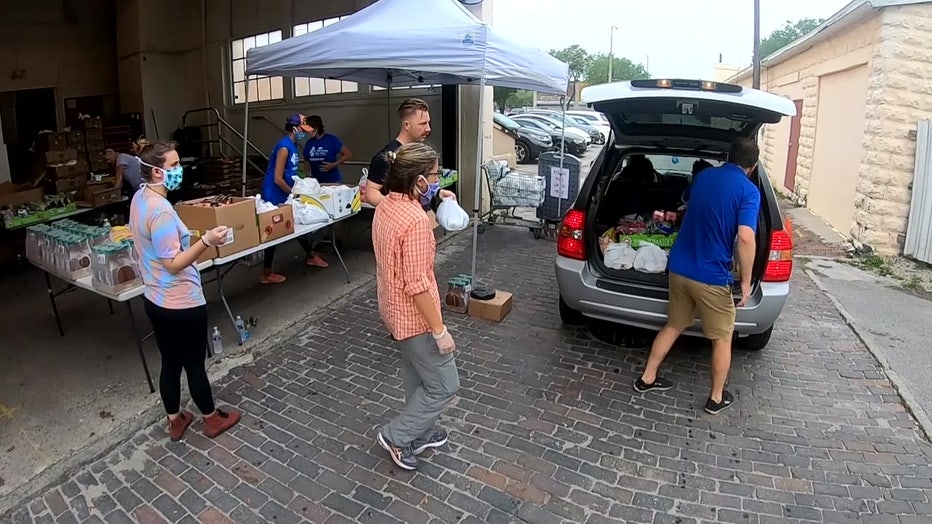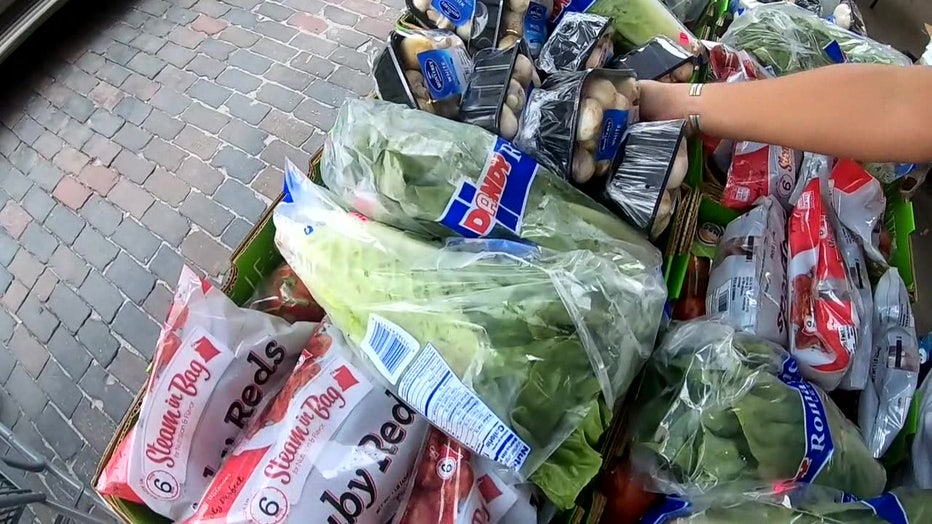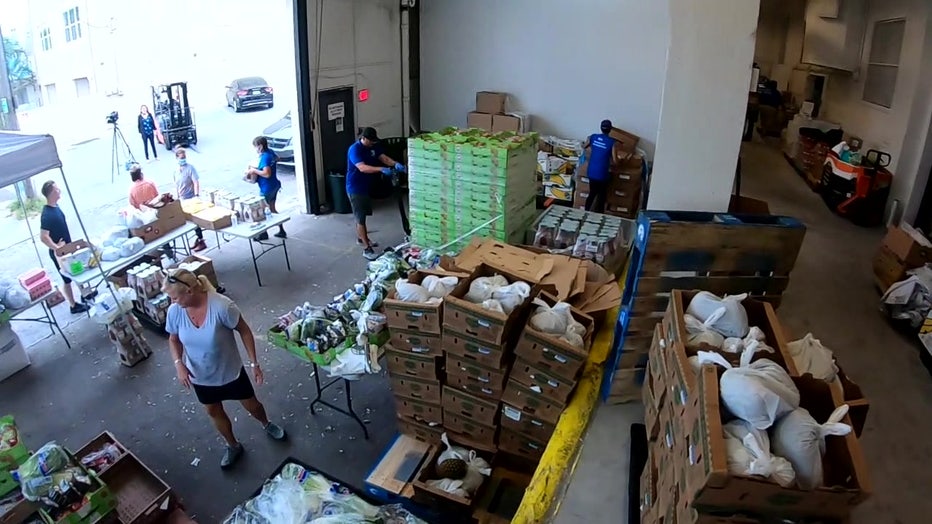Are you or your family in need of help getting food? Or do you want to help but don’t know how? We’ve put together a list of food pantries, drives, distribution sites, and more that could be the answer you are looking for.
Feeding Tampa Bay
Feeding Tampa Bay has teamed up with the city of Clearwater’s Parks and Recreation Department to distribute lunches daily for children 18 and younger.
Food will be distributed Monday through Friday at the following locations:
• Ross Norton Recreation Center, 1426 S. MLK Jr. Ave., 12:30-1:30 p.m.
• North Greenwood Recreation Center, 900 N. MLK Jr. Ave., 2:30-3:30 p.m.
Salvation Army
In addition to regular food pantry operations, the Salvation Army is partnering with Feeding Tampa Bay to host weekly drive-thru food distributions in Clearwater to help meet increased needs. Other services currently being offered across the county are rent, mortgage, utility assistance, family shelters, and emergency shelters as resources are available.
Drive-thru food box distribution will take place each Wednesday from 3:30-5 p.m. or until all boxes are distributed, at 1521 Druid Road East, Clearwater.
Boxes are pre-assembled and include fresh produce. Residents do not need to provide an ID or proof of address. People are encouraged to take only what they need.
Juvenile Welfare Board
Amid the COVID-19 crisis, low income families with children are disproportionately impacted, and those of moderate means may now be without a paycheck.
Licensed childcare for essential healthcare workers and first responders may be scarce. Financial and other stressors impact families, driving up domestic violence calls.
The Juvenile Welfare Board of Pinellas County is responding by investing in several emergency efforts, bringing partners together to identify and fill gaps.
Support to JWB funded agency nonprofits and their employees
• Emergency Response Fund: Allows all 50-plus nonprofit agencies — funded by JWB to serve children and families through early learning, home visiting, before/after school, domestic violence shelters, mental health services, and more — to access their budget allocations to cover operational expenses, including paying and retaining employees, should programs be required to close or reduce services due to COVID-19.
Food assistance for children and families
• $200,000 Emergency Food Relief: With retail food donations down nearly 75% to local food banks, JWB is investing $200,000 in emergency food relief for children and families, to be distributed to Tarpon Springs Shepherd’s Center, Religious Community Services in Clearwater, Florida Dream Center in Lealman, and St. Petersburg Free Clinic. Additional funds will be allocated as need presents.
• $350,000 Meals for Kids: In a proactive measure, JWB’s eight Neighborhood Family Centers were approved to double all pre-packaged meal purchases for kids; these Centers serve families in highest need areas.
• $12,000 Meals on Wheels 4 Kids: With school and congregate meal site closures, JWB is providing a portion of the initial funding for an innovative pilot with Tampa Bay Network to End Hunger to deliver meals to the doorstep of families with children when barriers exist and using the volunteer-based Meals on Wheels model.
• BreakSpot Grab & Go Meal Expansion: JWB is partnering with Feeding Tampa Bay to open additional Pinellas sites where grab-and-go meals for children can be distributed. JWB recently launched a new website with a schedule of all Pinellas school and community BreakSpot sites: www.jwbpinellas.org/breakspot-meals.
Basic needs assistance to families
• $1.7M Family Services Initiative Basic Needs Fund: JWB’s Family Services Initiative offers real-time basic need assistance to families, including rent/utility assistance, food, and household items. While this fund is in place for access by families year-round, it is especially critical given the current crisis. To request support, families should dial 2-1-1.
For more information on food assistance for Pinellas County children and families, visit www.jwbpinellas.org/childhood-hunger.
For the Family Services Initiative for basic needs assistance, families should dial 2-1-1 or visit https://211tampabay.org/family-services-initiative-fsi.
For those wishing to donate, JWB recommends contributions be directed to the Pinellas Community Foundation and their Disaster Relief and Childhood Hunger funds; visit www.pcfpinellas.org.
Pinellas County Schools
To reach more families in need during this unprecedented period of school closures, Pinellas County Schools will more than double the number of school sites for meal distributions.
Seven new sites went online starting April 6 and will be followed by six more school sites on Monday, April 13. This will bring the district’s total number of meal distribution locations from nine to 22.
The times and days will vary next week between the original nine locations and the seven new schools as PCS transitions to a consistent schedule for all 22 meal distribution school sites starting on April 13.
For the week of April 6, the nine original school sites and times remain. Thursday distribution will include meals for Thursday and Friday.
The schedule for the nine original school sites follows:
• Dunedin Middle School, 70 Patricia Ave., Dunedin — 10:45 to 11:45 a.m.
• Eisenhower Elementary, 2800 Drew St., Clearwater — 11 a.m. to noon
• Fairmount Elementary, 575 41st St. S., St. Petersburg — 10:15 to 11:15 a.m.
• Marjorie K. Rawlings Elementary, 6505 68th St. N., Pinellas Park — 11 a.m. to noon
• John Hopkins Middle School, 701 16th St. S., St. Petersburg — 10:30 to 11:30 a.m.
• New Heights Elementary, 3901 37th St. N., St. Petersburg — 10:45 to 11:45 a.m.
• Plumb Elementary, 1920 Lakeview Road, Clearwater — 11:15 a.m. to 12:15 p.m.
• Southern Oak Elementary, 9101 Walsingham Road, Largo — 11:15 a.m. to 12:15 p.m.
• Tarpon Springs Elementary, 555 Pine St., Tarpon Springs — 10:30 to 11:30 a.m.
Seven new school sites opened April 6 and distribute meals on Monday, Wednesday and Thursday only from 10:30 a.m. to 12:30 p.m. These schools will distribute two days’ worth of meals, including two breakfasts and two lunches on Monday, Wednesday and Thursday.
The seven new school sites include:
• Azalea Middle School, 7855 22nd Ave. N., St. Petersburg
• Bay Point Elementary School, 2151 62nd Ave. S., St, Petersburg
• Clearwater Intermediate, 1220 Palmetto St., Clearwater
• High Point Elementary School, 5921 150th Ave. N., Clearwater
• Kings Highway Elementary School, 1715 Kings Highway, Clearwater
• Largo Middle School, 155 Eighth Ave. SE, Largo
• Oak Grove Middle School, 1370 S. Belcher Road, Clearwater
Beginning the week of April 13, six new school sites open. All school sites switch to a Monday-Wednesday and Friday only from 10:30 a.m. to 12:30 p.m. All schools will prepare meals in the school site kitchens. Grab-n-Go bags include meals for two days — including two breakfasts and two lunches — per student adding Saturday for total of six days per week.
The six new school sites include:
• Anona Elementary School, 12301 Indian Rocks Road, Largo
• Garrison-Jones Elementary School, 3133 Garrison Road, Dunedin
• Gulfport Elementary School, 2014 52nd St. S., Gulfport
• McMullen Booth Elementary School, 3025 Union St., Clearwater
• North Shore Elementary School, 200 35th Ave. NE, St. Petersburg
• Sawgrass Lake Elementary School, 1815 77th Ave. N., St. Petersburg
Breakfast includes a cereal or breakfast bar, juice and milk. Lunch includes sandwich, fruit cup, juice, and milk. Meals will be served Grab & Go. Meals are free for anyone 18 years old and younger. The child or teen must be present to receive meals. Meals will be served as drive-thru at the car/bus circle. Walkers should go to the main entrance of the school.
YMCA partnerships
The YMCAs of the Tampa Bay are teaming up with community partners to feed families and fight food insecurity during these unprecedented times. The Tampa Metropolitan Area YMCA, YMCA of the Suncoast and YMCA of Greater St. Petersburg are working with Feeding Tampa Bay, local school districts and other organizations to help provide fresh food to families across Greater Tampa Bay.
Several YMCA locations also serve as food distribution sites in the following ways:
Feeding Tampa Bay Breakspot meals
Open to children 18 and younger. In a drive-thru type model, each child receives a free to-go meal for today and breakfast for tomorrow.
Monday-Friday, 10-11 a.m.
• Clearwater YMCA
1005 S. Highland Ave., Clearwater
Monday-Friday, 2 to 3 p.m.
727-461-9622
• Greater Ridgecrest YMCA
1801 119th St. N, Largo
727-559-0500
Mobile pantry
• St. Petersburg Free Clinic, 863 Third Ave. N., St. Petersburg.
Families with children at home can receive free family-friendly foods in a drive-thru type model.
Wednesdays, 10:30 a.m. to noon
• Child’s Park YMCA
691 43rd St. S., St. Petersburg
727-209-9622
Area food pantries
Residents are advised to call ahead before visiting a food pantry to see if they have food available.
Clearwater
BAY AREA PREGNANCY CENTER
2380 Drew St. #6, Clearwater
727-449-1988. Call for details.
CENTRAL CHRISTIAN CHURCH
1200 Keene Road S., Clearwater
727-446-0988
Fourth Saturday of every month from 8:30 a.m. to noon
CLEARWATER FIRST CHURCH OF THE NAZARENE
1875 Nursery Road, Clearwater
727-536-1498
Saturdays from 10 to 11:30 a.m.
CLEARWATER SEVENTH DAY ADVENTIST CHURCH
1445 Lakeview Road, Clearwater
727-446-6427
Wednesdays from 4 to 6 p.m.
COUNTRYSIDE BAPTIST CHURCH
2525 N. McMullen Booth Road, Clearwater
727-726-2550
Monday to Friday, 8 a.m. to 4 p.m.
*can come every 2 months
FLOWING RIVER CHURCH
1148 E. Turner St., Clearwater
727-461-1148
Fridays (except first of the month) from 2 to 4 p.m.
HELPING HANDS (COUNTRYSIDE CARES)
2565 Blackburn St., Clearwater
727-724-1290
*First 50 families
Monday to Thursday and Saturday from 8 to 11 a.m.
HIGH POINT NEIGHBORHOOD FAMILY CENTER
5812 150TH Ave N., Clearwater
727-533-0730
Thursday, 9 a.m. to noon (food pantry)
Friday, 10:30 a.m. to noon (GOA boxes)
NORTHWOOD PRESBYTERIAN CHURCH
2875 State Road 580, Clearwater, FL 33761
727-796-8090
Monday to Friday, 9 a.m. to 3:30 p.m.
RELIGIOUS COMMUNITY SERVICES (RCS)
700 Druid Road, Clearwater
727-443-4031
Monday-Wednesday, Friday, 12:30 to 3:30 p.m. Thursday, 12:30 to 6:45 p.m.
SALVATION ARMY – DRUID ROAD
1521 E. Druid Road, Clearwater
727-446-4177
Current clients only
Monday, Tuesday, Thursday, and Friday, 9:30 to 11:45 a.m.
ST. MARY COPTIC ORTHODOX CHURCH
2930 Country Road 193, Clearwater
727-644-5190. Call for details
SYLVAN ABBEY UNITED METHODIST
2817 Sunset Point Road, Clearwater
727-796-3057
Mondays 10 a.m. to 1 p.m.
Dunedin
CLEARWATER COMMUNITY CHURCH / HARRIET’S PANTRY
2897 Belcher Road, Dunedin
727-799-4444
Tuesdays, 10 a.m. to 2 p.m.
Thursdays, 12:30 to 3:30 p.m.
DUNEDIN CARES INC.
1620 Pinehurst Road, Dunedin
813-215-7773
Thursday, 10 a.m. to noon
Indian Rocks Beach
BEACH COMMUNITY FOOD PANTRY
Calvary Episcopal Church, 1615 First St., Indian Rocks Beach
727-595-2374, bcfoodpantry.org.
Monday and Wednesday from 10 a.m. to noon; Thursdays, 5 to 7 p.m.
Largo
ABUNDANT LIFE MINISTRIES
1550 S. Belcher Road, Largo
727-210-5433
Thursdays, 9 to 11 a.m.
BEACON STREET MINISTRIES
3470 Adrian Ave., Largo
727-278-2285
Thursdays 5:30 to 7 p.m.
INDIAN ROCKS BAPTIST CHURCH
12685 Ulmerton Road, Largo
727-595-3421
Thursdays 11 a.m. to 2 p.m.
Oldsmar
OLDSMAR CARES
163 State Road 580 W., Oldsmar
813-415-7373
Monday and Wednesday, 5:30 to 7 p.m.; Tuesday, Thursday, Friday and Saturday, 9 a.m. to noon
ROCK CHURCH OF TAMPA BAY
3970 Tampa Road, Oldsmar
727-657-4876. Call first, Monday and Thursday 10:30 a.m.-1:30 p.m.
Palm Harbor
FEAST FOOD
2255 Nebraska Ave., Palm Harbor
727-789-5275
Tuesday to Friday, 9 a.m. to noon
Pinellas Park
GOOD SAMARITAN CHURCH
6085 Park Blvd., Pinellas Park
727-544-8558
Monday, Tuesday and Thursday, 9 a.m. to noon
FIRST UNITED METHODIST CHURCH
9025 49TH St., Pinellas Park
727-546-5741
Mondays and Wednesdays, 9 to 11 a.m.
SACRED HEART CATHOLIC CHURCH
4661 82nd Ave N., Pinellas Park
727-541-4447
Tuesdays and Thursdays, 9 to 11 a.m.
ST. GILES FOOD PANTRY
8271 52nd St. N., Pinellas Park
727-544-6856
Monday to Thursday, 9:30 a.m. to 12:30 p.m.
SUNCOAST HAVEN OF REST RESCUE MISSION
1763 Ninth Ave N., Pinellas Park
727-545-8282
Monday to Friday, 10 a.m. to 5 p.m.; Saturday, 10 a.m. to 1 p.m.
Safety Harbor
MATTIE WILLIAMS NEIGHBORHOOD FAMILY CENTER
1003 Dr. MLK Jr. St. N., Safety Harbor
727-791-8255
Thursdays, 9-11 a.m. and 5-6 p.m.
Seminole
FEEDING GOD’S PEOPLE
10944 70th Ave., Seminole
727-459-6022
St. Petersburg
ASAP HOMELESS SERVICE
3050 First Ave S., St. Petersburg
727-328-3260
Monday to Friday, 10 a.m. to 3 p.m.
BETHEL AME CHURCH
912 Third Ave N., St. Petersburg
727-822-2089
Tuesdays, 10-10:30 a.m.
BETHEL BAPTIST CHURCH
3455 26th Ave S., St. Petersburg
727-327-0554
Wednesdays and Saturdays, 10 a.m. to 1 p.m.
CLEARVIEW UNITED METHODIST CHURCH
4515 38th Ave. N., St. Petersburg
727-522-4673
Thursdays, 9:30 to 11 a.m.
DAYSTAR LIFE CENTER
226 Sixth St S., St. Petersburg
727-825-0442
Monday, Tuesday, Thursday and Friday, 8:30 a.m. to 3 p.m.
ELIM SDA CHURCH
4824 Second Ave. S., St. Petersburg
727-350-3531
Wednesdays, 9 to 11 a.m.
LEALMAN AND ASIAN NEIGHBORHOOD FAMILY CENTER
4255 56th Ave. N., St. Petersburg
727-520-9820
Monday to Thursday, 8 a.m. to 7:30 p.m.; Friday, 8 a.m. to 3:30 p.m.
MERCY KEEPERS
2021 Ninth Ave. S., St. Petersburg
727-823-8795
Tuesdays and Thursdays, 10 a.m. to noon and 12:30 to 1:45 p.m.
NORTHSIDE BAPTIST CHURCH
6000 38th Ave. N., St. Petersburg
727-329-9166
Wednesdays, 6 to 8 p.m.; Fridays, 10 a.m. to noon
NORTHWEST PRESBYTERIAN CHURCH
6330 54th Ave. N., St. Petersburg
727-544-4551
Wednesdays, 9 a.m. to noon
PASADENA COMMUNITY CHURCH
5501 31st St S., St. Petersburg
727-381-2499
Must call first, Second Thursday of the month, 9:30 to 11:30 a.m.
PASADENA PRESBYTERIAN CHURCH
100 Pasadena Ave. N., St. Petersburg
727-479-6150
Second Saturday of the month, 8:30 a.m. to 1:30 p.m.
Still providing food but must call ahead
PEOPLE THAT LOVE CHURCH AND MISSION
817 Fifth Ave. N., St. Petersburg
727-820-0775
Food and clothing available at 2 p.m. Monday to Friday
PINELLAS COMMUNITY CHURCH
5501 31st St. N., St. Petersburg
727-866-1184
Tuesdays and Thursdays, 5 to 6:45 p.m.
THE KIND MOUSE PRODUCTIONS
1801 16th St. N., St. Petersburg
Visit thekindmouse.org or call 727-575-7834.
ST. BARTHLOMEW’S EPISCOPAL CHURCH
3747 34th St. S., St. Petersburg
727-867-7015
First and third Sunday of the month, 10:30 a.m. to noon
ST. LUKE’S UNITED METHODIST CHURCH
4444 Fifth Ave. N., St. Petersburg
727-321-1335
Mondays 5 to 6:30 p.m.
ST. PETE FREE CLINIC
863 Third Ave. N., St. Petersburg.
Food donations accepted Mondays, Tuesdays and Thursdays from 9:30 am.-12:30 p.m.
Visit https://stpetersburgfreeclinic.org.
ST. VINCENT DE PAUL CLARA’S CLOSET (HOLY FAMILY CATHOLIC PARISH)
200 78th Ave. NE, St. Petersburg
727-526-5783
Monday to Friday, 10:30 a.m. to noon, 1 to 3 p.m.
WESLEY UNITED METHODIST CHURCH
301 37th Ave. N., St. Petersburg
727-896-4797
Monday, Wednesday and Friday, 9 a.m. to noon
Tarpon Springs
ST. IGNATIUS CATHOLIC CHURCH
715 E. Orange St., Tarpon Springs
727-937-4050
Monday, Wednesday and Friday, 10 a.m. to noon
THE SHEPHERD CENTER
304 S. Pinellas Ave., Tarpon Springs
727-939-1400
Monday, Wednesday, Thursday and Friday, 10 a.m. to 1:30 p.m.
To view the full news story by The Suncoast News, visit http://www.suncoastnews.com/news/where-to-find-donate-food-in-pinellas-county/article_3a7520a6-7c2b-11ea-9a9e-9f6a7e0bf6f4.html




